Top 14 Juices for Diabetic Patients
Last updated on : 14 Jul, 2025
Read time : 21 min
Most individuals with diabetes find it difficult to find a drink that won’t spike their blood sugar levels. When we think of juices, we often think of fruit juices. Incorporating fresh juices may seem like an excellent way to add a wide range of fruits and vegetables to their diet. However, some juices are unfit for consumption as they may spike blood sugar levels. This is especially true for fruit juices.
We’ve got you a quick guide of 14 juices that are not just safe but also healthy for people with diabetes!
Can People With Diabetes Drink Juice?
There’s a lot of discussion around whether people with diabetes can drink juices. They are often seen as a no-go for them. Most juices, especially packaged ones, are high in sugar and low in fibre, which can cause a rapid spike in blood sugar levels. Unlike whole fruits that contain fibre to slow down sugar absorption, strained juices lack this component.
So, here are a few things that people with diabetes must remember before consuming juices:
- Portion control is key. Even the healthiest juice can disrupt sugar balance when consumed in excess quantities. Limit your juice consumption to one or ½ cups.
- Always pair a glass of juice with protein or healthy fats to reduce a blood sugar spike.
- Choose fruits/vegetables with a low glycemic index (GI).
- Choose fresh and unsweetened fruits/vegetables to prepare your juices.
Avoid added sugars or artificial sweeteners in your juice.
Fruits & Fruit Juices in Diabetes: Are They Safe?
Myth: ‘We can’t eat fruit if we have diabetes.‘
Fact: Fruits can be a healthy part of a balanced diet for individuals with diabetes. While fruits contain natural sugars, they also provide essential vitamins, minerals, and fibre that benefit overall health.
Fruits benefit people with type 2 diabetes because they contain a lot of fibre. Fibre slows digestion and absorption of sugar(fructose in fruits) into the blood stream. This can help prevent quick spikes in blood sugar levels.
It is essential to remember that drinking fruit juices may not be as beneficial as eating whole fruits for people with diabetes because the juice often lacks the fibre found in the fruit. This can cause the sugar in the juice to be absorbed more quickly, leading to higher blood sugar levels.
However, some fruits positively affect blood sugar levels and particularly benefit people with type 2 diabetes. These fruits are often called “magical” because they can manage blood sugar levels.
The key is to consume fruits in moderation and choose fruits with lower glycemic indexes, which means they have less influence on blood sugar levels.
Read Also: Beetroot for Diabetes Its Benefits and Risks
Best Juices For Diabetic Patients
Fresh fruit and vegetable juices can provide essential nutrients and help prevent illnesses. However, if you have diabetes, it is essential to consider its impact on blood sugar levels.
For individuals with diabetes, it’s crucial to follow a balanced diet that prevents sudden spikes in blood sugar. While fruit juices are popular among non-diabetic individuals, they may not suit those with diabetes.
People with diabetes must select nutritious and delicious juices to keep sugar levels in control. With a wide selection, it’s crucial to opt for juices that are lower in sugar and consume them in moderation to maintain a balanced diabetic diet.
By incorporating healthy drinks into your daily routine and staying mindful of your carbohydrate intake, you can enjoy the benefits of fruit juices while managing your diabetes effectively.
Let’s look at 14 of the best juices for people with diabetes.
1. Bitter Gourd Juice

Bitter gourd juice is the best choice for those with diabetes because it can lower blood sugar levels. You can either drink the bitter gourd juice as a whole or add lemon and cucumber to make it tastier.
Nutritional Value of Bitter Gourd Juice
- Protein: 0.9 g
- Calories: 16
- Carbs: 3.4 g
- Fibre: 2.6 g
- Fat: 0.2 g
- Vitamin C: 95% of the RDI
- Vitamin A: 4% of RDI
- Folate: 17% of the RDI
- Zinc: 10% of the RDI
- Potassium: 6% of the RDI
- Iron: 5% of the RDI
*The Reference Daily Intake (RDI) values represent the amount of a nutrient recommended daily to support optimal health.
2. Amla Juice

Amla juice, also known as Indian gooseberry, is a healthy choice for people with diabetes. It contains Vitamin C and antioxidants. You can enjoy a refreshing glass of freshly squeezed amla juice by adding stevia water to sweeten it.
Nutritional Value of Amla Juice
- Carbohydrates: 13.7 g
- Proteins: 0.5%
- Fat: 0.1%
- Energy: 58 kcal
- Fibre: 3.4%
- Iron: 1.2 mg
- Calcium: 50 %
- Carotene: 9 mg
- Thiamine: 0.03mg
- Riboflavin: 0.01mg
- Nicene: 0.2mg
3. Spinach Juice
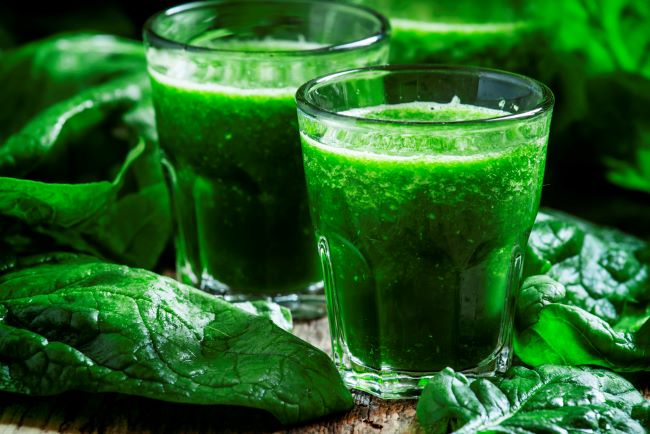
Spinach is an excellent choice and the best juice for diabetics for people with diabetes because it has few carbohydrates. One cup of spinach only contains 1 gram of carbohydrates. But that’s not all! Spinach is packed with essential nutrients that are good for your body.
Nutritional Value of Spinach Juice
- Water: 92.4 g
- Energy: 28 Kcal
- Carbohydrates: 2.64 g
- Protein: 2.91g
- Fibre: 1.6 g
- Calcium: 67mg
- Magnesium: 93mg
- Potassium: 460mg
- Vitamin C: 30.3mg
Read more: Benefits of Green Leafy Vegetables
4. Pomegranate Juice
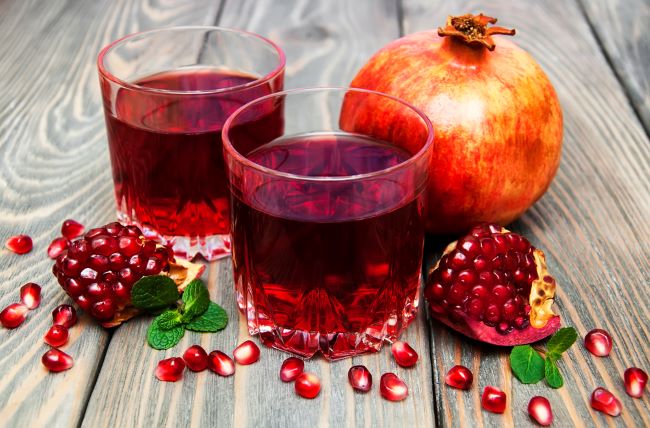
Pomegranate juice is a nutritious choice packed with beneficial nutrients. It contains vitamin C, fibre, folate, and potassium, which are essential for health.
It also has a low glycemic index (GI), which means it doesn’t cause a rapid increase in blood sugar levels compared to other foods or beverages. It is the best fruit juice for diabetes.
Nutritional Value of Pomegranate Juice
- Protein: 4.7 g
- Fat: 3.3 g
- Carbohydrates: 52 g
- Calories: 234
- Sugar: 38.6 g
- Fibre: 11.3 g
- Calcium: 28.2 mg
- Magnesium: 33.8 mg
- Iron: 0.85 mg
- Phosphorus: 102 mg
- Vitamin C: 28.8 mg
- Potassium: 666 mg
Read more: Health Benefits of Pomegranate
5. Carrot Juice
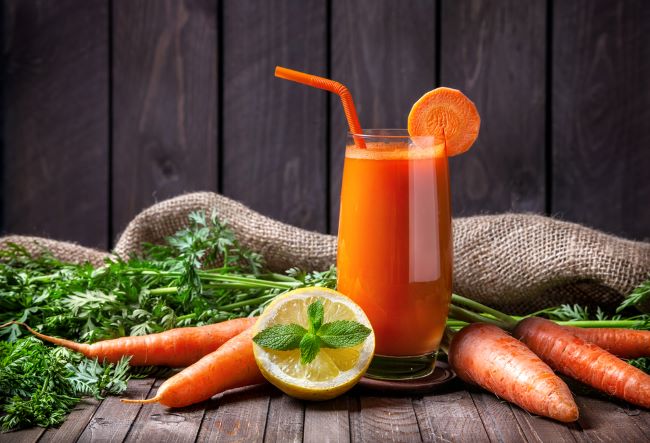
Carrots may taste sweet, but they can help manage sugar levels. When eaten appropriately, carrots do not significantly increase blood sugar levels.
In addition to their sweet taste, carrots are packed with beneficial minerals, vitamins, and carotenoids.
Nutritional Value of Carrot Juice
- Energy: 94 kcal
- Protein: 2.24 g
- Fat: 0.35 g
- Fibre: 21.9 g
- Potassium: 689 mg
- Vitamin C: 20.1 mg
- Vitamin B-1: 0.217 mg
- Vitamin B-6: 0.512 mg
- Vitamin A: 2.290 mcg
- Vitamin K: 36.6 mcg
6. Herbal Tea

Herbal teas such as hibiscus, chamomile, ginger, and peppermint are excellent choices for people with diabetes. These teas provide a soothing, flavorful drink and contain compounds that can help fight diseases.
Nutritional Value of Herbal Tea
- Calories: 37 g
- Total Fat: 0.7 g
- Carbohydrate: 7 g
- Potassium: 9 mg
- Protein: 0.4 g
- Sodium: 3 mg
- Fibre: 0.3 g
- Sugar: 6 gm
7. Tomato Juice

Tomato juice is the best juice for people with diabetes and is suitable for them because it can help improve their blood health. People with diabetes have higher odds of developing blood clots, which can harm their heart and blood vessels.
Drinking a glass of tomato juice without any added sugar can help reduce this risk.
Read Also: Tomato benefits and its nutritional value
Nutritional Value of Tomato Juice
- Calories: 41
- Protein: 2 g
- Fibre: 2 g
- Vitamin A: 22% of RDI
- Vitamin C: 74% of RDI
- Vitamin K: 7% of RDI
- Vitamin B1: 8% of RDI
- Vitamin B3: 8% of RDI
- Vitamin B6: 13% of RDI
- Vitamin B9: 12% of RDI
- Magnesium: 7% of RDI
8. Watermelon Juice
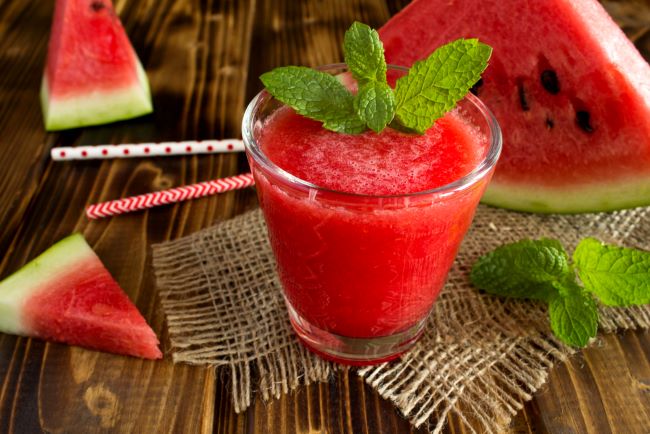
Watermelon is known for its high antioxidant content, which can help manage complications associated with type 2 diabetes. It supports a healthy immune system, enhances metabolism, and can contribute to maintaining healthy skin.
Nutritional Value of Watermelon Juice
- Calories: 71
- Carbs: 17.97 g
- Protein: 1.45 g
- Fat: 0.36 g
- Fibre: 1 g
- Sodium: 2 mg
- Vitamin C: 21% of RDI
- Vitamin A: 7% of RDI
- Potassium: 6% of RDI
9. Mosambi Juice

Mosambi (also known as sweet lime) juice has a low glycemic index; thus, it does not cause a sudden spike in blood sugar. It is suitable for diabetic patients but should be consumed in moderation.
Nutritional Value of Mosambi Juice
- Calories: 25 kcal
- Carbohydrate: 8.4 g
- Fibre: 0.4 g
- Fat: 0.1 g
- Potassium: 117 mg
- Calcium: 14 mg
- Phosphorus: 14 mg
- Iron: 0.9 mg
- Vitamin C: 30 mg
10. Coconut Water

Coconut water is refreshing and contains essential minerals. It is beneficial for maintaining electrolyte balance and can help lower blood pressure.
Drinking coconut water can have positive effects on diabetes management. It can help lower glycated haemoglobin levels and measure long-term blood sugar control.
Nutritional Value of Coconut Water
- Calories: 19 kcal
- Carbs: 3.7 g
- Protein: 0.7g
- Fat: 0.2 g
- Fibre: 1.1 g
- Sodium: 105 mg
- Potassium: 250 mg
11. Lemon Juice
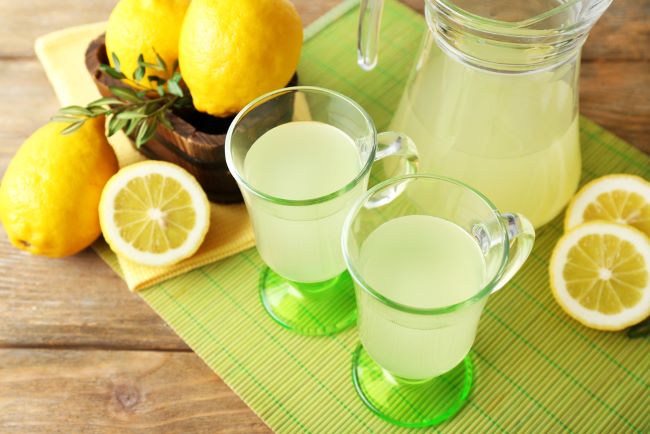
Lemon juice is a healthy choice for people with diabetes. Lemons are packed with essential nutrients like antioxidants and vitamin C, which can help regulate blood sugar levels. These nutrients are beneficial for managing diabetes.
Nutritional Value of Lemon Juice
- Water: 92.3 g
- Energy: 22 kcal
- Protein: 0.35 g
- Total lipid (fat): 0.24 g
- Fibre: 0.3 g
- Calcium: 6 mg
- Iron: 0.08 mg
- Magnesium: 6 mg
- Phosphorus: 8 mg
- Potassium: 103 mg
Read more: Benefits of honey and lemon-infused water
12. Kombucha
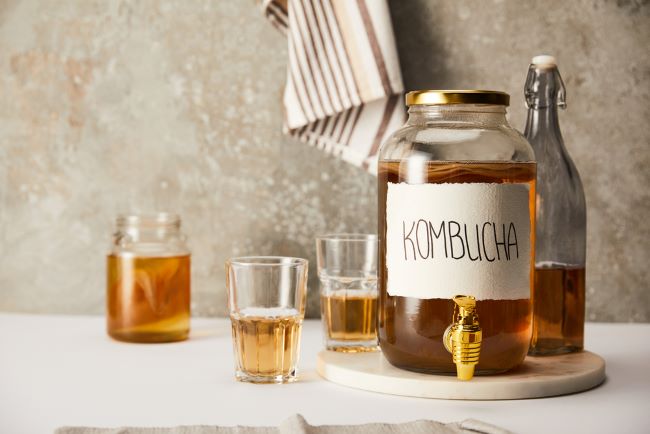
Probiotics are good bacteria that maintain a healthy gut. If you’re watching your sugar intake, Kombucha, made from black or green tea, can be an excellent choice for a fermented drink. It contains beneficial probiotics.
Nutritional Value of Kombucha
- Calories: 34 kcal
- Total fat: 0.6 g
- Sodium: 11 mg
- Total Carbohydrates: 5.8 g
- Calcium: 2.2 mg
- Iron: 0.2 mg
- Potassium: 156.6mg
13. Apple Juice

You can make delicious and healthy juice by blending fresh carrots, crisp apples, tangy lemon, and spicy ginger. This juice is tasty and packed with essential vitamins and minerals. It can boost your immune system, keep your heart healthy, help with digestion, and regulate blood pressure.
Nutritional Value of Apple Juice
- Calories: 46 kcal
- Water: 88.2 %
- Carbohydrate: 11.3 %
- Protein: 0.1 %
- Fats: 0.13 %
- Sugar: 9.62 %
- Fibre: 0.2 %
Read more: Apple Benefits
14. Orange Juice
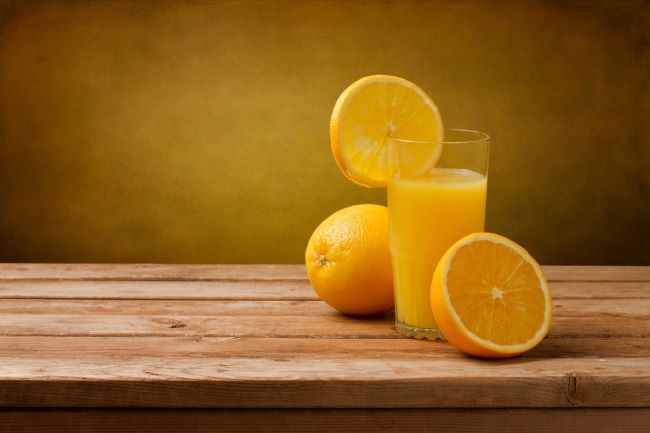
Consider your orange juice by squeezing fresh oranges in the comfort of your residence.
Including whole fruits in your diet is highly recommended as they contain significant amounts of antioxidants and fibre crucial for maintaining good health. Therefore, it would be wise to consume whole fruits instead of simply drinking juice.
Nutritional Value of Orange Juice
- Calories: 110 kcal
- Carbs: 25.5 g
- Fibre: 0.5 g
- Protein: 2 g
- Vitamin A: 4% of the RDI
- Vitamin C: 137% of the RDI
- Vitamin B6: 7% of the RDI
- Thiamine: 18% of the RDI
- Folate: 11% of the RDI
- Potassium: 14% of the RDI
Recommended Juices for People with Diabetes
1. Baidyanath Karela Jamun Juice (1 Ltr)
A powerful blend of Karela (bitter gourd) and Jamun (Indian blackberry), this juice helps regulate blood sugar levels naturally. It’s rich in antioxidants and known for its anti-diabetic properties. This juice is a great addition to your daily routine, especially for those looking to manage diabetes effectively.
2. Dabur Jamun Neem Karela Juice (1 Ltr)
This juice combines the benefits of Jamun, Neem, and Karela, making it an excellent choice for controlling blood sugar levels. Neem helps cleanse the blood, while Jamun and Karela are well-known for their anti-diabetic properties. This juice supports overall health while managing diabetes.
3. MyUpchar Ayurveda Madhurodh Juice (1000 ml)
A unique blend of Ayurvedic herbs, Madhurodh Juice is designed to help regulate sugar levels and prevent diabetes-related complications. Its natural ingredients not only help manage diabetes but also promote overall wellness.
Things to keep in mind
- Enjoy fruit juices in moderation to maximise their benefits.
- Store-bought fruit juices often contain added sugar and preservatives that can spike blood sugar levels, making them unsuitable for people with diabetes.
- Incorporate fruit juices into your diet while monitoring your carbohydrate intake.
- To prevent blood sugar spikes, have fruit juice with a meal, especially alongside high-fibre foods, healthy fats, or proteins.
- Always consult with your doctor/diabetologist or nutritionist before consuming fruit juices.
High-Sugar Fruits to Avoid if You Have Diabetes
- People with diabetes must avoid the following fruits and juices prepared using them due to their high sugar content:
- Bananas: Bananas are high in natural sugars and can cause blood sugar spikes.
- Grapes: Grapes have a high sugar content, which can affect blood glucose levels.
- Mangoes: While mangoes are delicious, they are also high in sugar.
- Pineapple: Pineapple is a tropical fruit with a sweet taste, but it contains significant amounts of natural sugars.
Takeaway Message
Here are some of the key takeaways:
- Monitor blood sugar levels: To manage diabetes effectively, it’s essential to regularly check your blood sugar levels and work closely with your healthcare provider. This will help you understand how different juices may impact your blood sugar.
- Seek professional guidance: Consult your healthcare provider or a registered dietitian who can provide personalised advice based on your health needs. They can help you select the best approach for incorporating juices into your diet.
- Be mindful of sugar content: Pay attention to the sugar content of the fruits and vegetables used in your juice. Some fruits, like oranges or grapes, contain higher levels of natural sugars. Consider choosing lower-sugar options like berries or green vegetables for your juice.
- Consider fibre: Juicing removes the fibre from fruits and vegetables, impacting how your body digests and absorbs the sugars. Try incorporating fibre-rich ingredients or consuming whole fruits and vegetables alongside your juice.
Remember, it is crucial to work closely with your healthcare provider to develop a suitable plan for managing diabetes and safely including juices into your diet.
Frequently Asked Questions
Certainly, apple juice can benefit individuals with Diabetes when consumed in moderation. Although it still contains sugars, the sugar level of apple juice is relatively low, meaning it does not significantly impact blood sugar levels. Therefore, incorporating apple juice into a balanced diet could be a practical choice for those looking to manage their blood sugar levels effectively.
It is feasible for individuals with diabetes to consume a small quantity of beet juice occasionally, as it has a moderate sugar level. However, it is crucial to remember that consuming juices as a person with diabetes may result in occasional spikes in blood sugar levels. Therefore, it is advisable to drink beet juice in moderation and under the direction of a doctor to avoid any adverse effects.
Carrot juice can be a safe and healthy option for diabetic patients due to its low sugar content, preventing sudden spikes in blood sugar levels. Despite containing some sugars, it is recommended for those with diabetes as a nutritious and beneficial addition to their diet.
You may be surprised to know that some fruits don’t contain any sugars at all. For example, olives and avocados are often overlooked as fruits but are pretty healthy options. Other fruits, such as rhubarb, lime and starfruit, contain some sugar, but only a tiny amount – about half a gram per half cup.
Replacing sugar with honey in a diabetes diet offers no significant benefits. The impact on blood sugar levels is similar for both honey and sugar. However, due to its higher sweetness, using honey in smaller quantities than sugar might be more appropriate in specific recipes.
Dates are high in natural sugars and carbohydrates, which can significantly increase blood sugar levels. Therefore, individuals with diabetes should consume dates in moderation and consider their overall carbohydrate intake before doing so.
Almonds are a nutritious choice for individuals with diabetes. They are low in carbohydrates and high in healthy fats, fibre, and protein, which can help regulate blood sugar levels. However, due to their calorie content, portion control is still necessary.
Unsweetened herbal teas and plain coffee or tea without added sugars can be good choices for a person with diabetes. Water is considered the safest drink. It contains no sugar or carbohydrates and helps keep the body hydrated.
Some drinks with zero sugar include water, unsweetened tea (such as herbal or green tea), black coffee, and sugar-free artificially sweetened beverages. It’s essential to check the labels and ingredients to ensure no added sugars.
Berries (such as strawberries, raspberries, and blackberries), avocados, lemons, and limes are generally lower in sugar content. When consumed in moderation, these fruits can be good options for individuals with diabetes.
Kiwi is a fruit that can be included in a diabetes-friendly diet. It is relatively low in sugar and rich in fibre, vitamins, and antioxidants. However, due to its carbohydrate content, portion control should be considered.
Tropical fruits like bananas, pineapples, and mangoes have higher sugar content. While individuals with diabetes can still enjoy these fruits, they must be consumed in moderation and consider their impact on blood sugar levels.
Certain dry fruits, such as almonds, walnuts, and pistachios, can be good choices for individuals with diabetes. These fruits are lower in sugar than dried fruits like raisins or dates. However, portion control is still necessary due to their calorie content.
Bananas have a higher sugar content than other fruits, so they should be consumed moderately by individuals with diabetes. The ripeness of the banana can also affect its glycemic index. It’s advisable to consult with a physician or dietitian to determine the appropriate portion size and frequency for including bananas in a diabetes management plan.
Guava juice, like any fruit juice, can increase blood sugar levels due to its natural sugar content. However, the impact on blood sugar will depend on factors like the amount consumed and the individual’s overall diet and blood sugar management. Individuals with diabetes should consume guava juice in moderation and monitor their blood sugar levels accordingly.
Three drinks that individuals with diabetes should generally avoid or consume sparingly are sugary beverages like sweetened tea or coffee, regular soft drinks, and sweetened alcoholic beverages.
Expert Quote
“Choosing a healthy juice can be tricky for people with diabetes. When consuming juices, the key lies in portion control and choosing fresh, unsweetened juices over packaged ones.”
– Dr. Sachin Singh
Disclaimer
The content provided within this article has been thoroughly verified for accuracy. However, we advise consulting a healthcare professional before utilising any medication or dietary supplements mentioned herein.
References
- Murphy, M. M., Barrett, E. C., Bresnahan, K. A., & Barraj, L. M. (2017). 100 % Fruit juice and measures of glucose control and insulin sensitivity: a systematic review and meta-analysis of randomised controlled trials. Journal of Nutritional Science, 6. https://doi.org/10.1017/jns.2017.63
- Visvanathan, R., & Williamson, G. (2021). Effect of citrus fruit and juice consumption on risk of developing type 2 diabetes: Evidence on polyphenols from epidemiological and intervention studies. Trends in Food Science & Technology, 115, 133–146. https://doi.org/10.1016/j.tifs.2021.06.038
- Fruit Juice and Diabetes – What Juice Can Diabetics Drink. (2018). Diabetes.co.uk. https://www.diabetes.co.uk/food/juice-and-diabetes.html
- Du, H., Li, L., Bennett, D., Guo, Y., Turnbull, I., Yang, L., Bragg, F., Bian, Z., Chen, Y., Chen, J., Millwood, I. Y., Sansome, S., Ma, L., Huang, Y., Zhang, N., Zheng, X., Sun, Q., Key, T. J., Collins, R., & Peto, R. (2017). Fresh fruit consumption in relation to incident diabetes and diabetic vascular complications: A 7-y prospective study of 0.5 million Chinese adults. PLoS Medicine, 14(4). https://doi.org/10.1371/journal.pmed.1002279
- Validate User. (n.d.). Academic.oup.com. https://academic.oup.com/jcem/article/106/10/e4097/6290732
Disclaimer
Our healthcare experts have carefully reviewed and compiled the information presented here to ensure accuracy and trustworthiness. It is important to note that this information serves as a general overview of the topic and is for informational purposes only. It is not intended to diagnose, prevent, or cure any health problem. This page does not establish a doctor-patient relationship, nor does it replace the advice or consultation of a registered medical practitioner. We recommend seeking guidance from your registered medical practitioner for any questions or concerns regarding your medical condition.
Popular Articles
Recommended Articles
Recent Articles
Company
About UsHealth ArticleHealth StoriesDiseases & Health ConditionsAyurvedaAll MedicinesAll BrandsNeed HelpFAQSubscribe
Registered Office Address
Grievance Officer
Download Truemeds
Contact Us
Our customer representative team is available 7 days a week from 9 am - 9 pm.
v4.4.2
2025 - Truemeds | All rights reserved. Our content is for informational purposes only. See additional information.
Our Payment Partners





















































